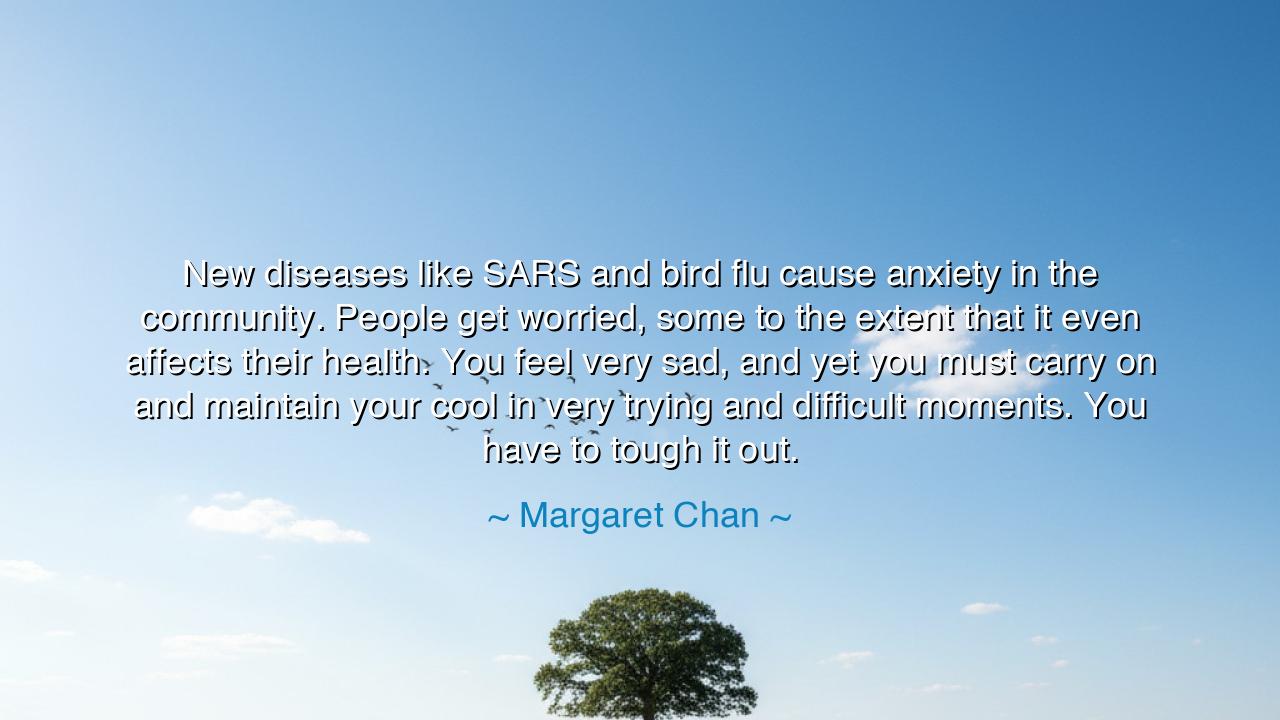
New diseases like SARS and bird flu cause anxiety in the
New diseases like SARS and bird flu cause anxiety in the community. People get worried, some to the extent that it even affects their health. You feel very sad, and yet you must carry on and maintain your cool in very trying and difficult moments. You have to tough it out.






Hear, O seekers of strength, the solemn words of Margaret Chan, who once guided the world through storms of pestilence and fear: “New diseases like SARS and bird flu cause anxiety in the community. People get worried, some to the extent that it even affects their health. You feel very sad, and yet you must carry on and maintain your cool in very trying and difficult moments. You have to tough it out.” These words, spoken in the shadow of great epidemics, are not only the counsel of a physician but the wisdom of one who has borne the burden of entire nations trembling in fear.
First, let us reflect on the rise of diseases unknown, sudden like a tempest sweeping through the land. The names SARS and bird flu strike like thunder, reminders that humanity, despite its towers and machines, remains vulnerable to the smallest of adversaries: a microscopic seed that can topple kingdoms. In these moments, fear spreads faster than the sickness itself, for uncertainty is a fire that consumes the mind and weakens the body. Chan speaks here not only of medicine, but of the struggle to master fear.
Behold the phrase: anxiety in the community. In times of pestilence, the heart of a people grows heavy. Streets empty, neighbors eye one another with suspicion, and even the healthy feel the weight of dread pressing upon them. This anxiety, as Chan warns, can itself become an illness, eroding strength, lowering defenses, and robbing life of its joy. Truly, she names a truth the ancients knew well: that the spirit, once shaken, can wound the body.
And yet, she counsels: you must carry on and maintain your cool. Here we see the call to heroism, not in battlefields, but in hospitals, homes, and marketplaces. Leaders, healers, and even common citizens must learn to steady themselves amidst chaos, lest fear itself become the greater plague. This is not denial, but discipline: the ability to face sorrow and still walk forward, to know despair but not be mastered by it.
History gives us many examples. Recall the tale of Florence Nightingale, who walked the wards of Crimea amidst filth, disease, and death. Though her heart must have been crushed by sorrow at the suffering she witnessed, she carried on with quiet resolve, bringing order, cleanliness, and hope where there had been only despair. Like Chan, she “toughed it out,” not by avoiding sadness, but by enduring it with courage until light returned.
Thus the meaning of Chan’s words is revealed: grief is inevitable, fear is natural, but surrender is never an option. To tough it out is not to harden the heart, but to let the heart break and yet still choose to serve, to persist, to endure. For in times of disease, the strength of communities lies not only in medicine, but in the collective will to remain calm, compassionate, and steadfast.
So let this be the lesson to you, O listener: when hardship comes—whether in the form of sickness, grief, or trial—acknowledge the sadness, but do not be undone by it. Guard your mind from fear’s poison, speak calm into the hearts of others, and persevere with steady courage. When you feel weak, remember the countless souls before you who endured plagues, wars, and storms, and yet carried on. Take practical action: breathe deeply, steady your thoughts, support those around you, and walk forward with dignity. For though the night may be long, those who endure with patience and courage shall one day see the dawn.






AAdministratorAdministrator
Welcome, honored guests. Please leave a comment, we will respond soon